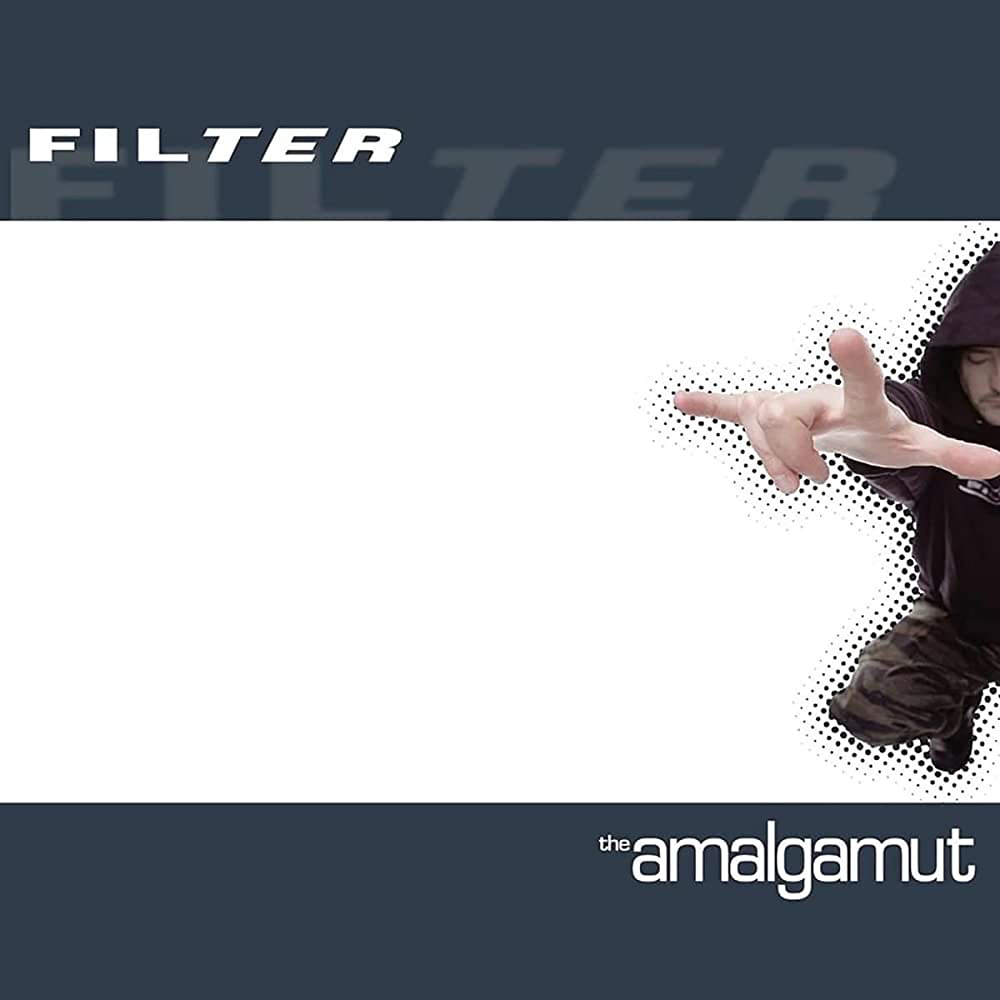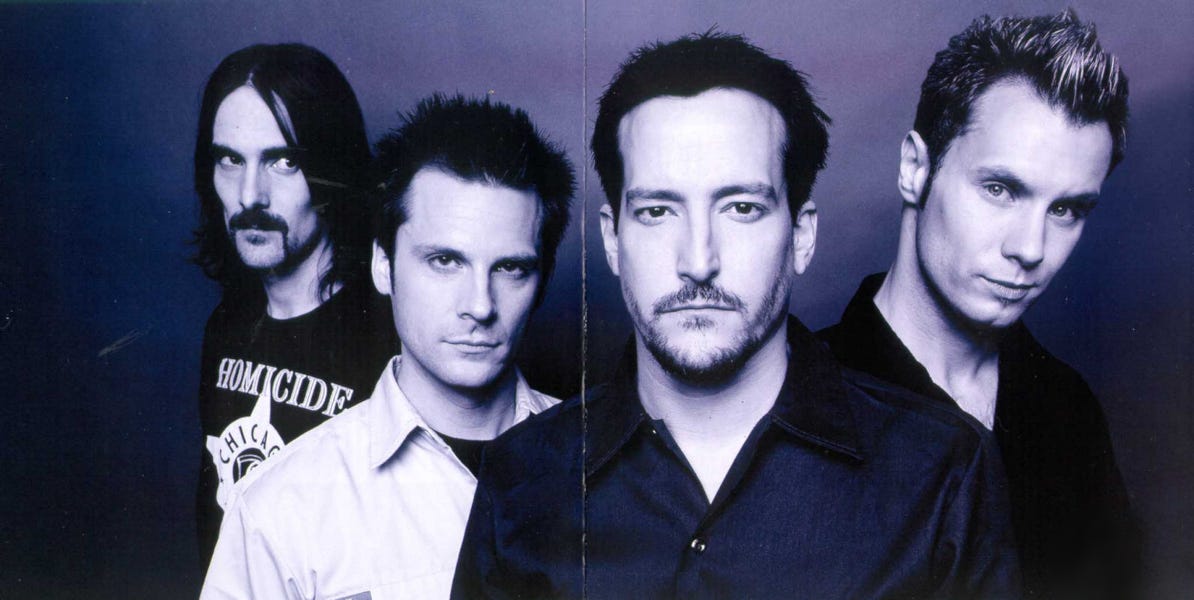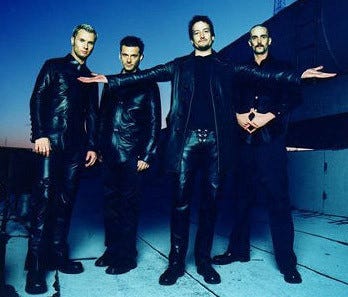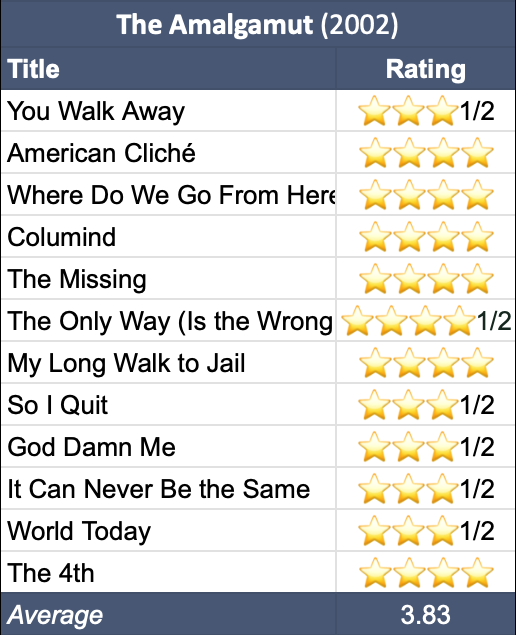Release Date: July 30, 2002
Genre: Industrial rock, hard rock
Label: Reprise Records
Producer(s): Ben Grosse, Richard Patrick, Rae DiLeo, Geno Lenardo
I've never admitted this to anyone, but the spring I was 15, I became fascinated with the Columbine shootings. I know, I know -- but there is an origin story. A local community theatre was putting on Columbinus, a play loosely based on the story of the massacre, and I auditioned for it. I didn't get cast, but I realized there was this whole huge historical event that I was too young to remember, so I went looking for movies and songs inspired by the tragedy. (I already knew one, "Cassie" by Flyleaf; another band who made one will show up here in about three months.) "Columind" by Filter, the internet told me, was another. And what do you know, I already knew a couple other Filter songs from -- where else -- the fan forums I used to go on. That website had shut down by then, but it seemed like a sign that it was time to get the CD.
The Amalgamut is a record chock full of early aughts social and political commentary, among other things. The sound mixes a lot of elements. Sometimes the guitars are distorted electric grinds, other times they're acoustic. Sometimes frontman Richard Patrick (who got his start in Nine Inch Nails) delivers his vocals with harsh yelps, and other times they are clear and icy. Some of the songs are tuneful, with a straightforward verse-chorus structure, and those are usually my favorites, but there are also some that are more about the atmosphere and creating a mood. The whole album has a fairly unique, metallic texture, which their older work does too, but this is just a bit cleaner and deploys the messy parts more sparingly. It's overall a very cool, serious record that stands out from most of the other stuff I listened to back then, and even today.
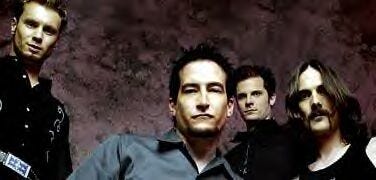
Highlights
Favorites:
The first half of the album has no skips, and starts with the one-two punch of "You Walk Away" and "American Cliché." They are somewhat similar grinding, mid-tempo rockers. They go well as the first two tracks because the former is about Patrick's personal struggles, probably with alcoholism, and the latter is about the struggles and tension he sees out in the world. Both of these themes will inform the rest of the songs.
"Where Do We Go From Here" is an anguished, mid-tempo tale of personal conflict. The verses are all clean instrumentation, strings chugging along with Patrick's voice right up the front. I don't always notice the drums on a song, but they're really one of the best parts here. Then, on the pre-chorus, a snarl comes into his delivery, and the electric guitars come in. I think this was the first song I heard from the album, and it's still up there for me, especially that second verse.
"The Only Way (Is the Wrong Way)" has a lot of the elements I like in "Where Do We Go From Here," but it's a little softer and more melodic. It trades the growling parts for moments where the vocals layer on top of each other or bubble under a thin, digital screen. The lyrics again feel personal, perhaps about Patrick's addiction, and he delivers them with great feeling. This is probably my favorite track, at least right now.
"My Long Walk to Jail" rocks hard, and the lyrics provide a convergence point where it could be about Patrick himself, or someone fictional, or everyone who has ever been in that situation all at once. It's loud and fierce without losing its grip on the melody, and I think it's really important for the album thematically. To me, this song is the man on the cover art. Perhaps he is the narrator of "You Walk Away" as well, rejected by loved ones who turned judgmental before his final fate.
Least Favorites:
The one actual song here that I don't really dig is "It Can Never Be the Same." It's similar to a lot of the other heavier songs we've heard by this point on the album. There's also a lyric that describes the struggle or conflict as a "flu." I am definitely not one to nitpick metaphors in lyrics, but it's an odd word choice that doesn't go anywhere, and kind of adds to the impression that this track doesn't have much new.
"World Today" and "The 4th" are tricky to assess. They're basically two interludes to conclude the album. "World Today" starts off with tinny drums and something resembling a hook, but fades into just an eerie, quivering voice repeating "Oh, what a hell of a place" over and over until the end. I think these actually make a strong ending for the album itself. They're great bookends for songs like "American Cliché." I'm not sure both were necessary; these are the reason for the hour-long runtime. And they're not for playlists or anything. I would never listen to them on their own, outside of the album, and I don't see why anyone really would.
Final Thoughts
Simply put, The Amalgamut is a great, inspired, and cohesive album. There are some stand-out songs that are great on their own, but it hangs together even better as a full body of work. It is the kind of thing I have to be in a certain mood for, but when I am, I can hear the craft from the first seconds to the last. I didn't ever get another Filter album after this, partly because I was satisfied with this one, partly because the band were on hiatus when I discovered it, after Richard Patrick finished rehab. They're still around, though he's the only original member these days. Time goes on, and their new music seems to still have that social commentary focus that it always did. The Amalgamut will live on as a snapshot of that early aughts tension, channeled into some killer tunes.
Rating
I was pretty sure this would clear ⭐️⭐️⭐️⭐️, and once I gave the whole thing a few re-listens, I was double sure.
Further Reading
I couldn't find any podcasts about this album. They must exist, but they're not showing up for me -- Filter, like many twentieth-century bands, have a name that turned out to not be great with search engines. I wish I could have found more pictures, too, but alas.

